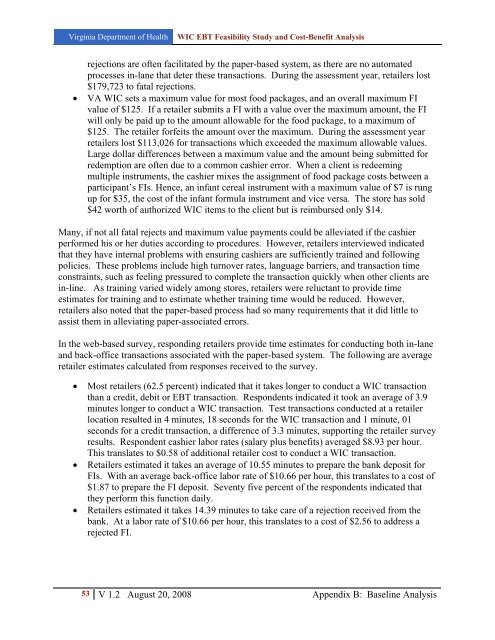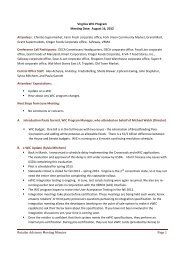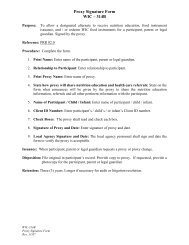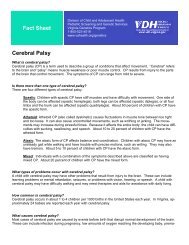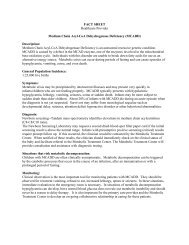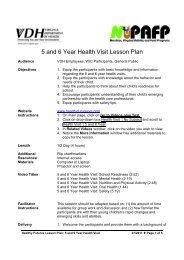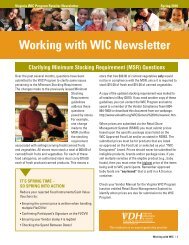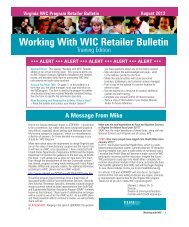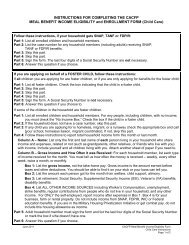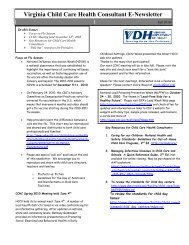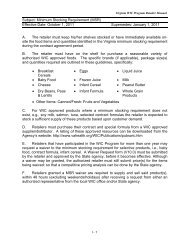WIC EBT Feasibility Study and Cost‐Benefit Analysis
WIC EBT Feasibility Study and Cost‐Benefit Analysis
WIC EBT Feasibility Study and Cost‐Benefit Analysis
You also want an ePaper? Increase the reach of your titles
YUMPU automatically turns print PDFs into web optimized ePapers that Google loves.
Virginia Department of Health <strong>WIC</strong> <strong>EBT</strong> <strong>Feasibility</strong> <strong>Study</strong> <strong>and</strong> Cost-Benefit <strong>Analysis</strong><br />
rejections are often facilitated by the paper-based system, as there are no automated<br />
processes in-lane that deter these transactions. During the assessment year, retailers lost<br />
$179,723 to fatal rejections.<br />
• VA <strong>WIC</strong> sets a maximum value for most food packages, <strong>and</strong> an overall maximum FI<br />
value of $125. If a retailer submits a FI with a value over the maximum amount, the FI<br />
will only be paid up to the amount allowable for the food package, to a maximum of<br />
$125. The retailer forfeits the amount over the maximum. During the assessment year<br />
retailers lost $113,026 for transactions which exceeded the maximum allowable values.<br />
Large dollar differences between a maximum value <strong>and</strong> the amount being submitted for<br />
redemption are often due to a common cashier error. When a client is redeeming<br />
multiple instruments, the cashier mixes the assignment of food package costs between a<br />
participant’s FIs. Hence, an infant cereal instrument with a maximum value of $7 is rung<br />
up for $35, the cost of the infant formula instrument <strong>and</strong> vice versa. The store has sold<br />
$42 worth of authorized <strong>WIC</strong> items to the client but is reimbursed only $14.<br />
Many, if not all fatal rejects <strong>and</strong> maximum value payments could be alleviated if the cashier<br />
performed his or her duties according to procedures. However, retailers interviewed indicated<br />
that they have internal problems with ensuring cashiers are sufficiently trained <strong>and</strong> following<br />
policies. These problems include high turnover rates, language barriers, <strong>and</strong> transaction time<br />
constraints, such as feeling pressured to complete the transaction quickly when other clients are<br />
in-line. As training varied widely among stores, retailers were reluctant to provide time<br />
estimates for training <strong>and</strong> to estimate whether training time would be reduced. However,<br />
retailers also noted that the paper-based process had so many requirements that it did little to<br />
assist them in alleviating paper-associated errors.<br />
In the web-based survey, responding retailers provide time estimates for conducting both in-lane<br />
<strong>and</strong> back-office transactions associated with the paper-based system. The following are average<br />
retailer estimates calculated from responses received to the survey.<br />
• Most retailers (62.5 percent) indicated that it takes longer to conduct a <strong>WIC</strong> transaction<br />
than a credit, debit or <strong>EBT</strong> transaction. Respondents indicated it took an average of 3.9<br />
minutes longer to conduct a <strong>WIC</strong> transaction. Test transactions conducted at a retailer<br />
location resulted in 4 minutes, 18 seconds for the <strong>WIC</strong> transaction <strong>and</strong> 1 minute, 01<br />
seconds for a credit transaction, a difference of 3.3 minutes, supporting the retailer survey<br />
results. Respondent cashier labor rates (salary plus benefits) averaged $8.93 per hour.<br />
This translates to $0.58 of additional retailer cost to conduct a <strong>WIC</strong> transaction.<br />
• Retailers estimated it takes an average of 10.55 minutes to prepare the bank deposit for<br />
FIs. With an average back-office labor rate of $10.66 per hour, this translates to a cost of<br />
$1.87 to prepare the FI deposit. Seventy five percent of the respondents indicated that<br />
they perform this function daily.<br />
• Retailers estimated it takes 14.39 minutes to take care of a rejection received from the<br />
bank. At a labor rate of $10.66 per hour, this translates to a cost of $2.56 to address a<br />
rejected FI.<br />
53 V 1.2 August 20, 2008 Appendix B: Baseline <strong>Analysis</strong>


